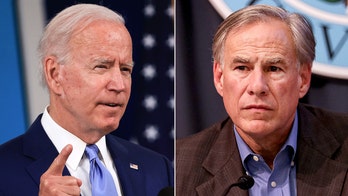Republican lawmakers are urging the Obama administration to hit pause on a bid to cede the U.S. government's last bit of oversight over the Internet, and are pushing a bill that would require an independent study before the transition can move forward.
At a brief committee meeting on Wednesday, Republicans continued to warn that the move could risk foreign governments making a play for Internet control.
"We cannot let the Internet turn into another Russian land grab," Rep. Marsha Blackburn, R-Tenn., said.
A House Energy and Commerce subcommittee plans to vote Thursday morning on the bill, by Rep. John Shimkus, R-Ill., that would require the Government Accountability Office to study the controversial proposal and issue a report before the administration can take action.
Rep. Fred Upton, R-Mich., warned that once the U.S. takes this step, "there's no going back."
At issue is an organization that administers the Internet -- a Los Angeles-based nonprofit called the Internet Corporation for Assigned Names and Numbers, or ICANN -- which the government for years has contracted with. But a Commerce Department agency announced in March that it would relinquish control over ICANN, presumably when its contract expires in September 2015. The office said it wants the group to convene "global stakeholders" to come up with a transition plan -- a transition to what remains unknown.
Some lawmakers and free Internet advocates have taken a skeptical view toward the transition, while others, including some prominent tech and telecommunications companies, have embraced it.
The U.S. government does not technically control ICANN, but it nevertheless maintains significant oversight through the contractual agreements the Commerce Department has with the group. ICANN manages some of the most important elements of the Internet, including the domain name system and IP addressing. Domains are those tiny suffixes at the end of Internet addresses, like .com and .org and .gov.
The Commerce Department, whose contract with ICANN lasts through September 2015, stressed in its announcement that whatever system comes to replace the existing one will not give control to other governments.
Lawrence Strickling, assistant secretary of commerce for communications and information, said last month that the announcement has led to "some misunderstanding about our plan with some individuals raising concerns that the U.S. government is abandoning the Internet. Nothing could be further from the truth." He said the transition "in no way diminishes our commitment to preserving the Internet as an engine for economic growth and innovation."
Democrats at the subcommittee meeting on Wednesday dismissed their GOP colleagues' concerns as unwarranted. Rep. Henry Waxman, D-Calif., warned that the bill would create "partisanship and division," noting that the technical functions of the domain name system are not technically controlled by the U.S. government. He described it more as a temporary "stewardship" role.
Upton said the proposal is merely calling for a study, and saying "we should look before we leap."




